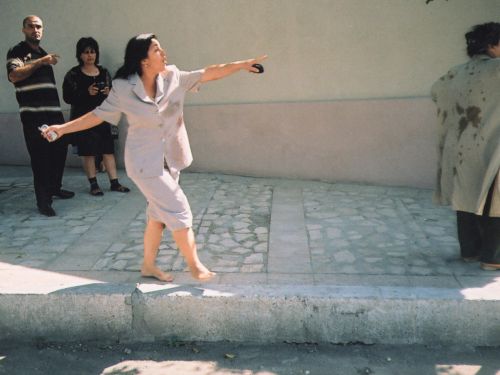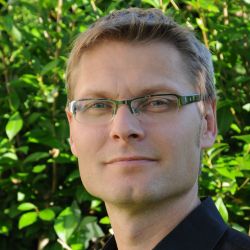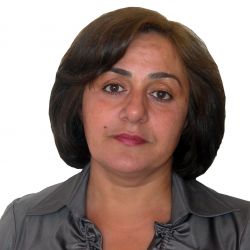Risking her own safety, Nasibova (40) reports on abuse of power, human rights violations and corruption in the isolated autonomous republic Nakhchivan, which is part of Azerbaijan. A correspondent for the independent information bureau, Turan in Azerbaijan and for Radio Free Europe/Radio Liberty’ she is also the leader of the human rights organisation Democracy and NGO’s Development Resource Center in Nakhchivan.

Above, Nasibova pointing to attackers after being beaten in 2002. The office of her NGO was attacked by a group of conservatives who blamed her for introducing western values to women of Nakhchivan, trying to change their mentality. Photo: Ilgar Nasibov/Radio Free Europe/Radio Liberty.
Nasibova has been a critical voice against the authorities for ten years and she steadfastly refuses to give up the fight for freedom of speech. She reports on violations by the police against ordinary citizens, kidnapping of members of the opposition, and attacks on journalists. In the absence of other independent institutions, Nasibova has become a kind of ombudsperson whom the local population turn to, to be heard.
Azerbaijan and Nakhchivan
Ilham Aliyev took over as president in Azerbaijan after his father in 2003 and has since lead the regime in a manner which has become more and more authoritarian. The opposition has been marginalised and the number of independent media has been severely reduced. The authorities force newspapers to limit their circulation and distribution, and in addition they monopolise radio and television. Attempts at criticising the authorities are met with threats, violence and arrests.
Journalists who write about corruption and abuse of power risk
imprisonment on false charges. If the situation is bad in Azerbaijan, conditions are even worse in the autonomous republic Nakhchivan, which is surrounded by Armenia, Iran and Turkey. This closed enclave is ruled by the iron hand of Vasif Talibov, who is closely related to president Aliyev. All opposition is suppressed. As a result of the extreme harassment they have experienced, there are hardly any independent journalists left in the region today. Nasibova’s professional journalism and independent, critical voice is therefore profoundly important.
Journalism in extreme conditions
Nasibova draws attention to the general lawlessness and the absence of public security in Nakhchivan. In a news report from 2007 Nasibova wrote: ‘Policemen came to the village and demanded that the local people paid electricity bills. Those who refused were beaten and
taken to the police station’. She further reported how several of those arrested were bound to trees and left for up to six hours in the cold February weather. The article ends with her usual laconic comment about how the local authorities deny that events have taken place in the way the victims’ describe them. In the same year, she reported about how the opposition politician Alesker Ismailov was forcibly admitted to a psychiatric hospital after he had written a complaint about the local police chief’s behaviour.
Nasibova has herself been arrested, brought before the courts and publicly harassed. The apartment where she lives with her husband and three children have been ransacked, their computer confiscated and her camera lens destroyed. She has received death threats, and has been physically attacked. Her husband, Ilgar Nasibov, also a journalist, was sentenced in 2007 to 90 days imprisonment for insulting a public servant. There is no doubt that the intention is to silence journalists in Nakhchivan, and first and foremost, Malahat Nasibova.
After she received death threats last winter, an employee in the information section of Department of Internal Affairs said that ‘journalists who don’t want to be threatened should avoid insulting ordinary citizens and getting on their nerves’. Inspite of all this, she will not be silenced and she refuses to leave Nakhchivan.
Council of Europe
When Azerbaijan was taken up as a member of the Council of Europe in 2001, one of the conditions of membership was that the state had to discontinue its practice of imprisoning members of the opposition. This has not happened. Azerbaijan also has the worst record in
Europe when it comes to the imprisonment of journalists. The Committee to Protect Journalists (CPJ) registered nine imprisoned journalists in 2007 and five in 2008. One of these, Novruzali Mammadov, died in prison in August this year. There are fewer and fewer independent voices left and new arrests are made on purely political grounds. In July 2009 two well known bloggers, Emin Milli and Adnan Hajizade, were arrested. There is no doubt that the arrests were politically motivated.
Azerbaijan does not comply with basic democratic principles. The lack of public security, for example, is a serious problem. Judges are appointed by the president and corruption is widespread in the legal system and police force, as well as in the private business world. The country is rich in oil and gas reserves and has a strategic position in the region. Many other countries involved in the region, prioritise economic and political energy interests above human rights, democracy and the rule of law.
Norway’s responsibility
By giving the 2009 Rafto prize to Malahat Nasibova the Rafto Foundation wishes to give prominence to an inflexible champion of free speech and a free press and at the same time to draw attention to a member of the Council of Europe which increasingly fails to meet its
democratic and human rights obligations towards its own citizens and the international society.
The Rafto Foundation is of the opinion that this is a development the Council of Europe and its individual member countries cannot accept. In light of the engagement of Norwegian companies in the oil industry in Azerbaijan, Norway carries a special responsibility.
The Board of the Rafto Foundation, September 24th, 2009
The 2009 Rafto Prize is awarded at the National Venue of Theatre (Den Nationale Scene), in Bergen, Norway on Sunday 1st of November at 18.00‐19.30
The Rafto Foundation in Bergen, Norway was established after the death of Professor Thorolf Rafto in 1986, in gratitude of his longstandig work to help people who are oppressed and persecuted, and in the realization that this work must be ongoing.
The Rafto Prize is a human rights award established in memory of professor Thorolf Rafto. The Prize is awarded annually by the Rafto Foundation. Several Rafto Laureates: Aung San Suu Kyi, Burma (Rafto Prize in 1990), people of East‐Timor by Josè Ramos‐Horta (Rafto Prize in 1993), Kim Dae‐jung, South‐Korea (Rafto Prize in 2000) and Shirin Ebadi, Iran (Rafto Prize in 2001) have subsequently been awarded the Nobel Peace Prize. The Rafto Prize contributes to a focus on human rights violations and on people and communities which need the attention of the world.
Contact information
The 2009 Rafto Prize Laureate
Malahat Nasibova
Mobile: +994 503 88 51 93
Phone: +994 136 45 67 19
Fax: +994 136 44 65 79
E-mail: nasibovam@gmail.com
melahet_n@yahoo.com
Languages: speaks Azerbaijani. Speak either English or Russian.
Phone lines to Malahat Nasibova in Nakhchivan have poor technical quality.
Other contacts for the press
Radio Free Europe/Radio Liberty
Kenan Aliyev RFE/RL Azerbaijani Service director in Prague
Phone: + 420 221 12 23 56
Mobile: + 420 724 17 50 67
E-post: AliyevK@rferl.org
Languages: English, Russian, Azerbaijani and Tyrkish
Kenan Aliyev can provide information on Malahat Nasibova and also interpret interviews between Malahat Nasibova and journalists.
Joanna Levison Senior Media Advisor for RFE/RL
Phone: + 420 221 12 20 80
Mobile: + 420 724 42 67 78
E-mail: levisonj@rferl.org
Languages: English and Russian
Ayaz Ahmedov Multimedia Producer for Azerbaijani Service of RFE/RL
Phone: +420 221 12 23 57
E-mail: ahmedova@rferl.org
Languages: English, Russian, Azerbaijani and Norwegian
Joanna Levison and Ayaz Ahmedov can provide information on Malahat Nasibova.
Press contacts in Norway Arne Liljedahl Lynngård ( right)
Arne Liljedahl Lynngård ( right)
The Rafto Prize Committee, Chairman
Mobile: +47 95 15 22 90
E-mail: arne.lynngard@rafto.no
Languages: English and Norwegian
Web: www.rafto.no
Martin Paulsen The Rafto Prize Committee, Member
Phone: +47 55 58 31 57
Mobile: +47 99 25 59 65
E-mail: martin.paulsen@if.uib.no
Languages: English, Norwegian and Russian
Web: www.rafto.no
www.uib.no/rg/future_r/contact-us/people/martin-paulsen
Berit Nising Lindeman
Advisor and Head of Information
The Norwegian Helsinki Committee
Mobile: +47 90 93 33 79
E-mail: lindeman@nhc.no
Languages: English and Norwegian
Web: www.nhc.no
Berit N. Lindeman has met Malahat Nasibova, the 2009 Rafto Prize Laureate. Lindeman is an experienced election observer and has worked with democracy development and human rights issues. Her work has focused on the countries from the former Soviet Union and Africa. Lindeman has ten years experience in democracy building and human rights work in Azerbaijan.
Kari Amble The Rafto Foundation, Head of Information
Phone: +47 55 21 09 75
Mobile: + 47 91 31 44 17
E-mail: kari.amble@rafto.no
Languages: English and Norwegian
Web: www.rafto.no
The Rafto Foundation Secretariat
Phone: +47 55 21 09 30
Fax: +47 55 21 09 59
E-mail: rafto@rafto.no
Web: www.rafto.no





